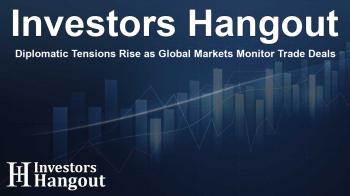Diplomatic Tensions Rise as Global Markets Monitor Trade Deals

Global Trade Diplomacy in Focus
The impending deadline for a temporary tariff freeze is approaching, prompting intensified global trade diplomacy. As nations across multiple continents navigate their trade relations, discussions on reciprocal tariffs led by President Donald Trump are in full swing. The October negotiations could drastically reshape how countries protect their economic interests while maintaining a balance with major powers.
Market Reactions and Investor Sentiment
Interestingly, market indicators suggest that investors are largely unfazed by the tensions surrounding trade agreements. The interim tariff pause initiated earlier this year catalyzed a noteworthy market upswing, propelling the S&P 500 higher by over 28% from its lows. This positive investor sentiment reflects a widespread belief that a significant trade breakdown is unlikely.
Monitoring Market Volatility
As tensions ebb and flow, the market's implied volatility, represented by the VIX Index, has remained relatively low, indicating a calm response from investors. As of recent reports, the VIX is below the 16.75 mark, suggesting that the market perceives the situation as manageable for the near term.
Strategic Compliance Measures
In conversations regarding trade compliance, U.S. Commerce Secretary Howard Lutnick recently indicated that the administration is poised to finalize agreements with several major trading partners. Every nation involved must align their practices with U.S. trade expectations, which include significant restrictions on Chinese manufacturing content in supply chains.
The Dilemma of Asian Economies
For Asian economies such as India, Vietnam, and Taiwan, this shift poses substantial challenges. Striking a balance between dependence on U.S. demand and their reliance on Chinese components in production could lead to a complicated path forward. The analysis from economists like Alicia Garcia Herrero highlights the complexities facing these countries as they attempt to navigate U.S. trade policies while defending their economic interests.
Europe's Balancing Act
Across the Atlantic, Europe is similarly navigating precarious waters. As the largest market for Chinese electric vehicles, the EU has experienced nearly €10 billion in Chinese investments. Nonetheless, looming threats of 50% tariffs from the U.S. if no agreements are reached has ignited urgency within European industry.
Insights from European Leaders
Former EU Chamber of Commerce president Joerg Wuttke articulated the EU's current stance, emphasizing the dual focus on American and Chinese trade interests. Industrial leaders are sounding alarms about the heavy reliance on Chinese imports, with figures like Stefan Scherer from AMG Lithium calling for European independence to ensure sustainable growth and competitiveness.
China's Stance on Trade Deals
As negotiations unfold, China is staunchly reinforcing its position against any trade agreements that might compromise its interests. The Chinese Commerce Ministry has issued a clear warning against deals that seek to undermine Chinese values in return for tariff reductions.
U.S. Warnings and Recommendations
Washington is alerting European nations to the potential pitfalls of tightening relations with China. Treasury Secretary Scott Bessent cautioned that such moves could be detrimental to European markets as they risk becoming conduits for Chinese goods banned in the U.S., ultimately compromising their economic sovereignty.
Upcoming EU-China Summit
Looking ahead, a summit between the EU and China is set for late July. Analysts predict that China aims to leverage this meeting to showcase strong ties with Europe and present a united front against U.S. pressures. As Garcia noted, the strategic dependencies fostered over the years place the EU in a nuanced position that may limit its negotiating power.
Frequently Asked Questions
What is the current state of global trade negotiations?
Global trade negotiations are intensifying as nations seek to establish favorable terms before impending tariff deadlines.
What impact have tariffs had on the stock market?
The announcement of a temporary tariff pause has triggered significant market rallies, indicating investor optimism.
How are Asian economies reacting to U.S. trade policies?
Asian economies find themselves in a complex situation, balancing U.S. demands with reliance on Chinese manufacturing.
What challenges does Europe face with trade relations?
Europe is trying to maintain strong trade relationships with the U.S. while navigating the risks posed by dependence on Chinese goods.
What warnings has the U.S. issued to its allies regarding China?
The U.S. has warned that deeper ties with China could harm the interests of its European allies in the context of trade.
About The Author
Contact Logan Wright privately here. Or send an email with ATTN: Logan Wright as the subject to contact@investorshangout.com.
About Investors Hangout
Investors Hangout is a leading online stock forum for financial discussion and learning, offering a wide range of free tools and resources. It draws in traders of all levels, who exchange market knowledge, investigate trading tactics, and keep an eye on industry developments in real time. Featuring financial articles, stock message boards, quotes, charts, company profiles, and live news updates. Through cooperative learning and a wealth of informational resources, it helps users from novices creating their first portfolios to experts honing their techniques. Join Investors Hangout today: https://investorshangout.com/
The content of this article is based on factual, publicly available information and does not represent legal, financial, or investment advice. Investors Hangout does not offer financial advice, and the author is not a licensed financial advisor. Consult a qualified advisor before making any financial or investment decisions based on this article. This article should not be considered advice to purchase, sell, or hold any securities or other investments. If any of the material provided here is inaccurate, please contact us for corrections.

